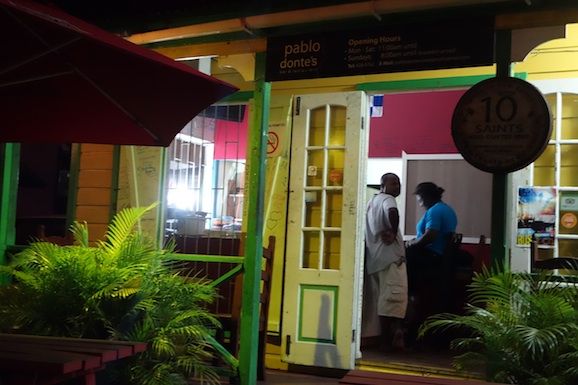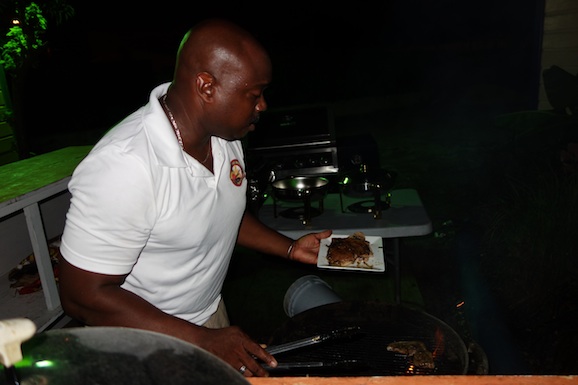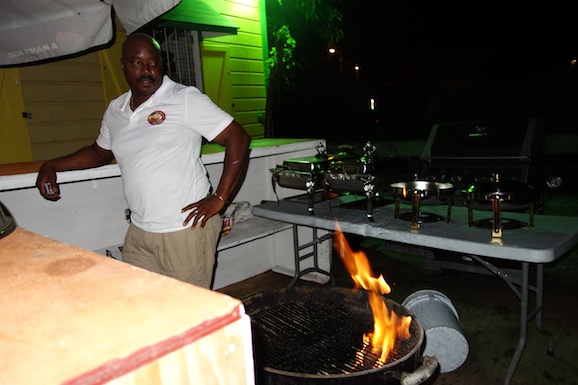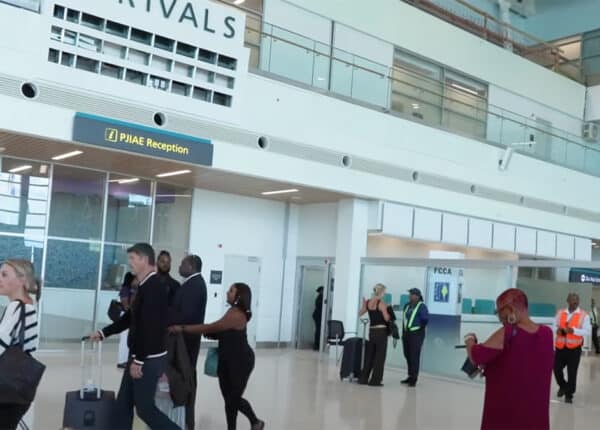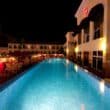The Baron’s Smokehouse at Pablo Donte’s in Barbados (All photos by CJ)
By Alexander Britell
ST LAWRENCE GAP, BARBADOS — I might have walked past Pablo Donte’s 99 times out of 100.
It was set at the very back of a tourist village made up of colourful shacks set on a cul-de-sac on a small lane.
Pablo Donte’s was the only bar open; the other doors were shuttered. 1980s music played, and smoke billowed from the back edge of the building.
Above: the entrance to Pablo Donte’s
Little did I know that I would soon have one of the best meals I’d ever had in the Caribbean.
After a few glasses of Mount Gay Extra Old, I scanned the brief menu and asked the waiter for the “fish bowl.”
Then the smoke billowed again, and I walked to the edge of the restaurant.
It’s there that Collis Williams, known as the “Baron,” works his magic.
This was the Baron’s Smokehouse, and it is truly one of the greatest places to eat in Barbados.
It is the culinary ideal: pure, local food, cooked in keeping with its surroundings.
Williams, a largely self-taught chef, has developed a rather impressive facility with the art of smoking steak, ribs and fish, working away at the side of Pablo Donte’s like a master artisan.
But Williams’ culinary history began, not in the kitchen, but in a corporate setting.
“My office was in front of the executive chef’s office, and that’s where my whole culinary everything was born,” he told me. “[The chef] would come into my office every day and say, ‘you need to taste this.’ And I was always trying something else — and I haven’t stopped.”
Soon, Williams’ exploration of smoking began, and he quickly discovered the fundaments of the art — from choosing the right wood (pimento or hickory) to finding that just-so combination of herbs and spices.
He is quick to remind that his food is not restaurant food — it is, as he says, “elegant Bajan soul food.”
“I don’t call it restaurant food, simply because it’s cooked from the heart. I’m going to take the time and put the fish on and connect with everybody who’s eating it,” he says. “What I find about restaurant food, it’s too commercial. And when you eat soul food, you can taste the difference.”
He’s being modest, of course — any restaurant that purports to serve smoked or grilled meat or fish could learn quite a bit from the Baron.
What makes his food so special, though, is his philosophy of place.
For Williams, food isn’t just about where you source the ingredients — it’s about ensuring that you actually taste the place you’re in.
And for Barbados, that means two herbs: marjory and thyme, which, he says, are “essential to our cuisine.”
“Wherever you go in the Caribbean, we love to cook with herbs,” he says. “We don’t do dry rubs — everything is wet. That’s the difference between how we cook as a Caribbean people and how the Americans do a lot of dry rubs.”
He points to a country like Jamaica, which he calls “fundamentally the only culture in the Caribbean that has a ‘taste.'”
And that largely comes from the smoking of select varieties of wood.
“What people don’t realize is that jerk, genuine jerk, when done right, is a taste,” he says. “Jamaicans are one of the peoples that have held on to infusing taste through woods, because back when your great grandfather cut a tree down, if it was an apple tree, you had the apple flavour [in your food], you brought that flavour.”
His careful, faithful smoking strategy is largely unique in Barbados, and whether it’s fish or a good old-fashioned ribeye, the results are sublime.
The craft is so unpretentious, the setting so relaxed that it’s a bit hard to describe just how good the food is.
But the Baron has, in this quiet corner of the otherwise-bustling St Lawrence Gap, created a pure, honest experience that represents some of the best of the Caribbean — good rum, warm service and spectacular food.
“Since time immemorial, it was that,” the Baron says. “You cut a tree down and you put hickory, you put cedar — this was the taste.”
It may sound simple. But the food is anything but.


